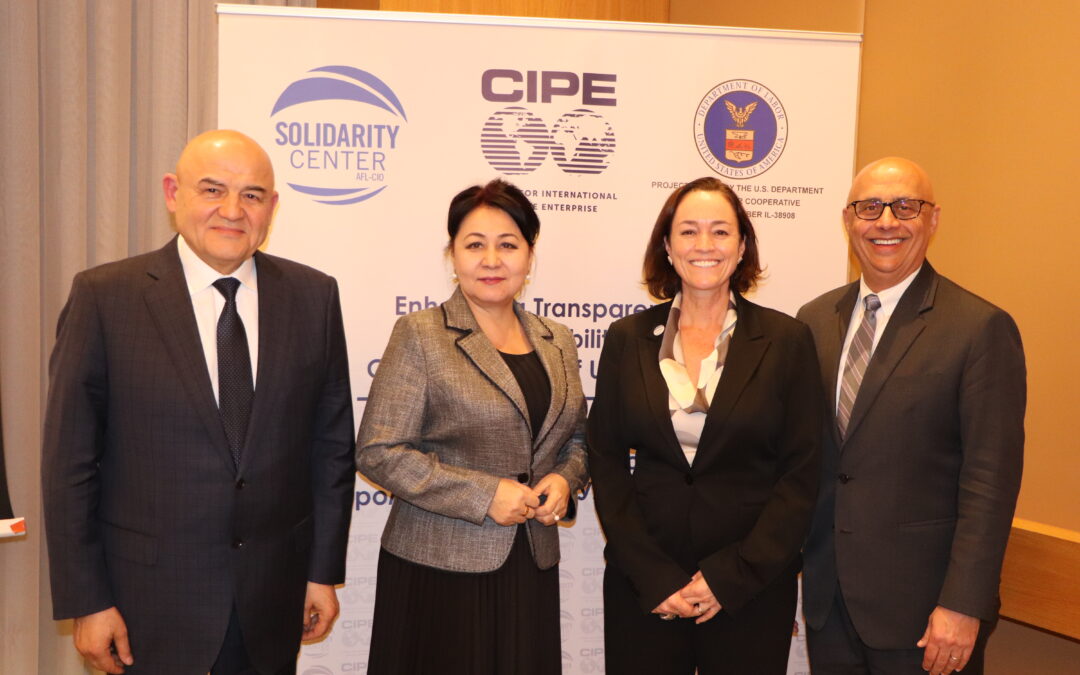A groundbreaking cooperative agreement seeking to improve working conditions and prevent forced labor was signed this week for workers, ‘at all stages of cotton and textile production in Uzbekistan.’ Agreement signatories include U.S.-based Center for International Private Enterprise (CIPE), employers’ Association of Cotton-Textile Clusters of Uzbekistan, the Solidarity Center and the Uzbekistan Ministry of Employment.
The two-year memorandum of cooperation is the cornerstone of a new CIPE-Solidarity Center project that was launched at a public event in Tashkent in November. By meeting the sector’s need for an effective reporting and grievance remedy system, and providing an education and incentive system supportive to compliance, the project seeks to build on a 15-year effort that successfully eradicated forced labor in Uzbekistan’s cotton supply chain.
The “Enhancing Transparency and Accountability in the Cotton Industry of Uzbekistan” project—which will be implemented by CIPE and the Solidarity Center through activities laid out in the agreement’s accompanying action plan—is funded by the U.S. Department of Labor.
“The Solidarity Center looks forward to working with CIPE and the Cluster Association to support development of a cotton industry in Uzbekistan that is recognized and rewarded in the global marketplace for upholding labor standards at the highest levels,” said Solidarity Center Executive Director Shawna Bader-Blau at the program launch.
Project goals include to expand stakeholder dialogue to promote transparent market and management standards and employee-oriented accountability systems; establish trust and dialogue among cotton purchasers, producers, workers and the government of Uzbekistan; strengthen Uzbekistan’s cotton supply chain workers’ capacity to identify and effectively resolve labor rights violations through tripartite mechanisms and improved dialogue with employers; improve compliance with international labor standards, including freedom of association and corporate governance provisions; and foster cotton industry sustainability in ways that ensure labor rights are respected and protected.
Under the agreement’s accompanying action plan, program activities will include:
- Developing and piloting worker-led grievance and remedy mechanisms grounded in best international practices for supply chain transparency and management;
- Training workers, managers and employers in the cotton industry on fundamental international standards as defined in core conventions of the International Labor Organization;
- Promoting standards of transparency and commitment to labor rights and good corporate governance by creating a dialogue between stakeholders cotton enterprises, global brands, government agencies and worker representatives.
“We believe that our partnership will support the creation of effective management systems and serves to strengthen social protection, improve labor relations based on international standards and create decent and safe working conditions for workers,” said CIPE Managing Director for Programs Abdulwahab Alkebsi at the program launch.
After years of intense policy advocacy and campaigning, led by Uzbek and international civil society, combined with the Uzbek Government’s political will, state-imposed forced labor is no longer used in the cotton harvest. As a result, in March 2022, the Cotton Campaign ended its call for a global boycott of cotton from Uzbekistan and lifted the Uzbek Cotton Pledge.

